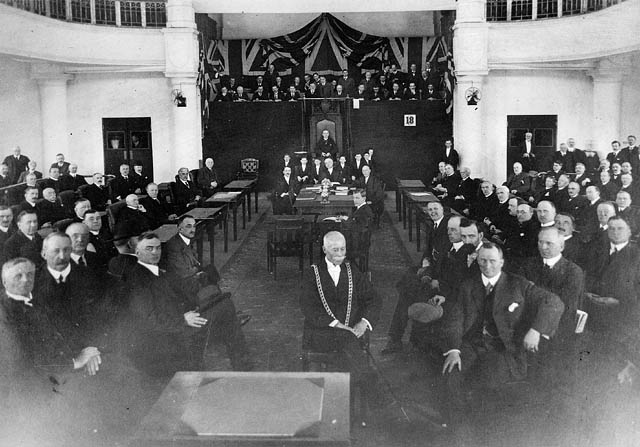Wednesday, October 22, was a day of endless confusion and rumour-mongering in Ottawa, for many long hours only the death of a single soldier at the War memorial being tragically definitive. Yet in the midst of everything else that was going on, one small factoid seemed to intrude itself throughout. From beginning to end, virtually all media kept referring to the besieged Members of Parliament as parliamentarians. But they weren’t parliamentarians. They were MPs, Members of Parliament. The difference is not just semantic.
Here’s the unhappy truth. Not all MPs, by a long shot, deserve to be called parliamentarians. An MP is to a parliamentarian as a person is to a mensch. Everyone is a person. Only the best can be a mensch. You begin as an MP, and then some — mostly alas a smallish minority — mature into parliamentarians.
Nothing shows the distinction better than our own House of Commons. The puerile partisanship of the Harper government’s responses to often legitimate questions in daily Question Period is the antithesis of acting like parliamentarians. Is Paul Calandra a parliamentarian? Pierre Poilievre? The PM when he stands up week after week during Duffy-gate repeating word for word the same dubious assertions? Or the trained seals behind them applauding mindlessly at whatever inanity or lie is peddled? This is contempt for parliament, nothing less. An MP might be contemptuous of parliament, and as we see too often is. A parliamentarian, by definition, cannot be.
Yet something wonderful happened in Ottawa last week after something terrible happened. The day after Cpl. Nathan Cirillo was murdered and every Member of Parliament barely escaped death, MPs, led by Stephen Harper himself, briefly elevated themselves into parliamentarians. They transformed themselves into women and men of dignity, rising above the fray to put humanity before ferocious partisanship. It almost redeemed one’s hope for Canadian democracy. Almost.
But even then, there was an edge to the proceedings. Even before anything was really known, from the get-go the government insisted on describing Cpl. Nathan Cirillo’s killer, Michael Zehaf-Bibeau, as a terrorist, rather than as a criminal or even a murderer. Here again, words matter. A word can contain multitudes, to paraphrase Walt Whitman. When Stephen Harper, parroted by several of his ministers, carefully described Zehaf-Bibeau as a terrorist, he was not merely saying that the killer had terrorized Ottawa. He was surely suggesting that Mr. Zehaf-Bibeau was an “Islamic terrorist” likely connected to the sadistic jihadis of ISIS. That meant, we were to understand, that he was probably not acting alone, that he was much more dangerous than a more conventional mass murderer like Justin Bourque, and that steps are needed, no doubt harsh ones, to give more powers to the police and security agencies without adding more oversight of them.
But context, like words, matters. Not every killer who terrorizes others is a terrorist in the way we understand it these days. Justin Bourque not only killed three Mounties in cold blood, he so terrorized all of Moncton that the city was placed on lockdown for more than a day. Though he was a home-schooled Christian, he claimed no religious motivation for his actions. On the contrary, he pleaded ideology, if we can dignify his deranged babble with such a concept.
Mr. Bourque told police that he wanted to stir up a rebellion against an oppressive, corrupt government that was squelching the freedom of most Canadians and serving only the rich. Yet not a soul believes he was some kind of communist terrorist, and at his trial he was treated as nothing more than a lone, vicious criminal. Like Mr. Zehaf-Bibeau, like Martin Couture-Rouleau two days before in Quebec, all these guys seem to be screwed-up loners, even if not legally insane.
But that’s not what the Harper government wants us to think. All last week, when we knew only that Mr. Zehaf-Bibeau considered himself a Muslim, the government insisted he was a terrorist. This week RCMP Commissioner Paulson unhelpfully pointed to a selfie video that Zehaf-Bibeau made allegedly showing he was driven by “political and ideological motives” and that he was acting in the name of Allah against Canadian foreign policy. Do we accept the words of a delusional man as valid? Are the police the best judges of a killer’s motives — if indeed a mentally ill man’s motives can be understood at all?
It has taken much courage this week for Thomas Mulcair to refuse to call Mr. Zehaf-Bibeau a terrorist. Since Mr. Mulcair was among those whom Mr. Zehaf-Bibeau might have killed, he can hardly be considered a softie on this issue. And we can guess that Canadians largely, if not overwhelmingly, agree with the Toronto Sun that the killer of course is an “Islamic terrorist.” Yet despite public opinion, Mr. Mulcair spoke out, rightly fearing the government’s intentions to exploit the traumatic events of October 22.
Based on present evidence, I’d say Mr. Mulcair is acting like a parliamentarian. By insisting on labeling the troubled Zehaf-Bibeau a terrorist, making him the excuse for drastic new security measures, the Harper government have reverted to being merely Members of Parliament. Too bad for Canada.
This article was originally published in The Globe and Mail.
Image: National Library of Canada



